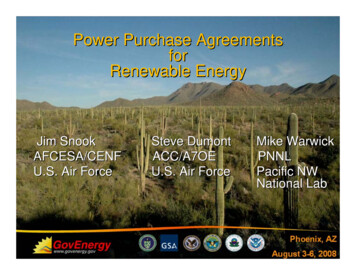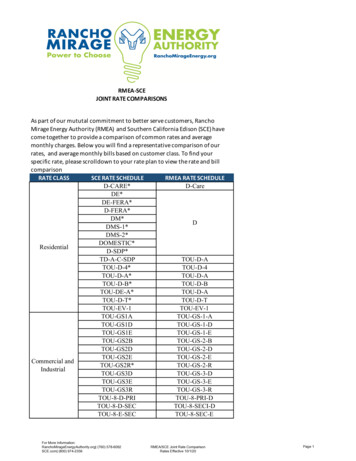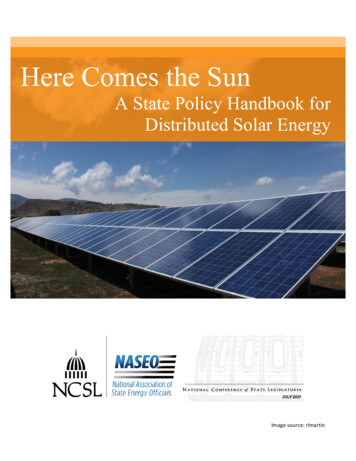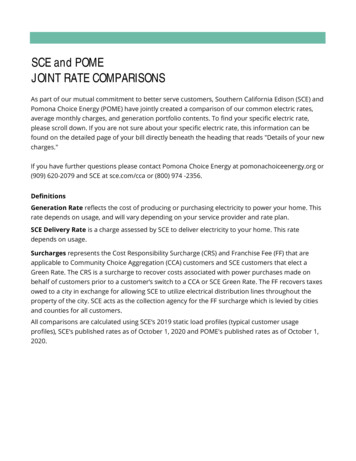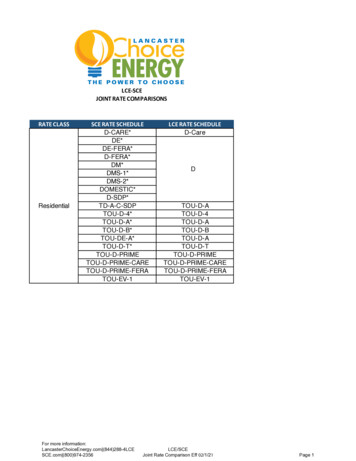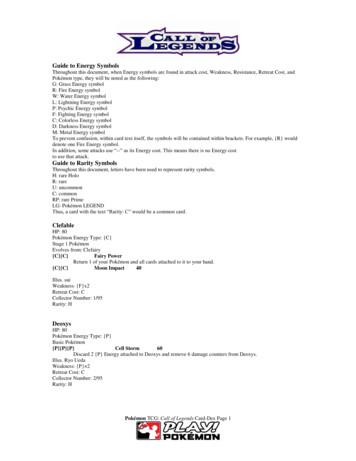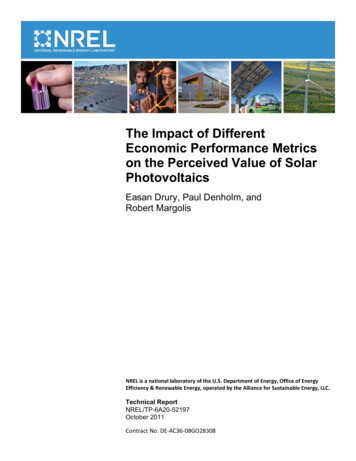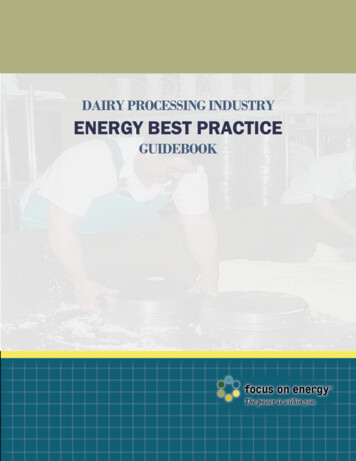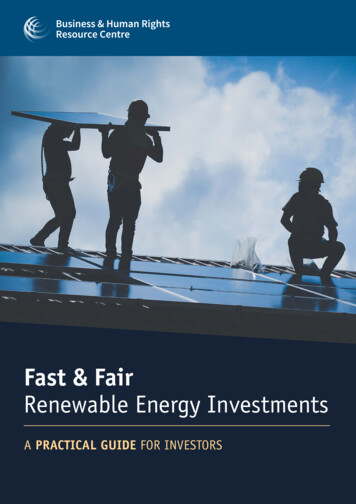
Transcription
Fast & FairRenewable Energy InvestmentsA PRACTICAL GUIDE FOR INVESTORS
Fast & Fair Renewable Energy Investments03Table of Contents04 Executive Summary Key Questions Investors Can Ask When Investing in Renewable Energy05 Practical Steps to Ensure Renewable EnergyInvestments Respect Human Rights Types of Companies Investors Can Work with on Renewable Energy Human Rights Due Diligence Further Resources for Investors07 Investor Snapshot:Wind Energy & Human Rights09 Investor Snapshot:Solar Energy & Human Rights11 Investor Snapshot:Bioenergy & Human Rights13 Investor Snapshot:Geothermal Energy & Human Rights15 Investor Snapshot:Hydropower & Human Rights17 Annex: Additional Charts & Statistics
Fast & Fair Renewable Energy Investments04Executive SummaryInvestors will play a pivotal role in shaping the urgent transition to low-carbon economies. Somealready lead the way in divesting from fossil fuels and committing to renewable energy. Manymore must follow to meet the climate goals set out in the Paris Agreement. These front-runnerinvestors now also have an opportunity to define the path forward for an energy sector thatrespects human rights, in order to ensure that our transition is not only fast, but also fair. Thistask is urgent as allegations of human rights abuse grow globally, putting investments and thetransition itself at risk.This briefing sets out how investors can help tackle the climate crisis while respectinghuman rights in a just transition.1 It brings lessons from our surveys of 109 renewable energycompanies, our investor engagement over the last three years, and insights from an expertadvisory group comprised of representatives from the UN-supported Principles for ResponsibleInvestment, the Interfaith Center on Corporate Responsibility, the Heartland Initiative, TransformFinance, the Investor Alliance for Human Rights, and the London School of Economics.Evidence shows that there is an urgent need to raise the bar on human rights in the renewableenergy sector. Investors will play a pivotal role in this. Since 2010, the Business & Human RightsResource Centre has identified 152 allegations of human rights abuses related to renewable energyprojects, and asked 103 companies to respond to these allegations.2 The frequency of allegationshas increased in recent years with one third of these allegations having occurred between 20172019. Abuse allegations include: killings, threats, and intimidation; land grabs; dangerous workingconditions and poverty wages; and harm to indigenous peoples’ lives and livelihoods. Allegationshave been made in every region and across each of the five sub-sectors of renewable energydevelopment: wind, solar, bioenergy, geothermal, and hydropower.3 The regions with the highestnumbers of allegations4 are Latin America (91 allegations since 2010, 60% of allegations globally)and Southeast Asia (38 allegations since 2010, 25% of allegations globally).Companies and investors have a responsibility to respect human rights as per the UN GuidingPrinciples on Business and Human Rights. However, most renewable energy companies donot currently have in place basic human rights policies and processes, which can help avoidor mitigate abuses and de-risk investment. We surveyed 109 renewable energy companiesbetween 2016 and 2018,5 nearly half of which (46%) did not have a basic human rightscommitment in place. Only five out of 59 companies included in the most recent outreach metfour basic criteria on human rights.6Investors can influence renewable energy companies to do better, using the power of theirinvestment to ask critical questions and push companies to think about these issues beforeabuses occur. Without respect for human rights through due diligence and adherence tointernational norms, renewable energy companies not only fall short of moral responsibilities butmay also face complications including negative press coverage, project suspension, delays, andlitigation that can also set back the transition to low-carbon economies.7Key Questions Investors Can AskWhen Investing in Renewable Energy Does the company have a publicly available commitment to respect human rights thatrefers to internationally recognized human rights norms? Does the company provide a grievance mechanism to workers and communitymembers when rights abuses occur, as outlined by Principle 31 of the UN GuidingPrinciples on Business and Human Rights? Does the company have a human rights due diligence process in place to identify andaddress salient human rights risks before they become abuses? Does the company expect its suppliers and business partners to adhere to thesame human rights standards, and does it include this expectation in contracts andagreements?
Respecting Rights in Renewable Energy Investments05Practical Steps to Ensure Renewable EnergyInvestments Respect Human RightsAll investors (both individually and in coordination with other investors and alliances) should: Ask renewable energy companies, asset managers, energy purchasers, or other relevant companies specific questions on human rights(see above) and follow up on any red flags identified (see subsector snapshots for specific examples). Engage with communities and workers: While companies have a responsibility under the UNGPs to consult with communities andworkers, most do not do so effectively, and thus generate distrust. Investors can encourage more meaningful engagement, and can alsoengage communities and workers directly in order to: Ensure community and worker voices are heard and actedupon, and their leaders respected, at all stages of a project,including in defining human rights due diligence, benefit-sharing,and remedy processes. Ensure companies have clear policies and processes torespect indigenous peoples’ rights, including land rights andfree, prior, and informed consent over the lifespan of the project,and effective access to grievance mechanisms at the project level. Ensure that companies have clear policies and processesguaranteeing workers all fundamental labour rights includingfreedom of association and collective bargaining, as well as aliving wage. Act as a conduit to the company for concerns raised byaffected communities, workers, and civil society with regardto these and other human rights related impacts. Use divestment as last-resort leverage when companies fail or refuse to adequately identify, avoid, mitigate, or remediate harms associatedwith human rights abuses. Ideally investors should remain engaged in order to encourage positive behavior change, but when change is notpossible or imminent, divestment should seriously considered as a demonstration of the investor’s commitment to human rights. Urge policy-makers to support a fast and fair transition: Collaborate on joint investor statements or speak out individually to call for a just transitionto a low-carbon economy, including strong human rights safeguards in national energy policies and international policy frameworks.DIRECTINVESTMENTS(PRIVATE ORPUBLIC EQUITY)PRIOR TO INVESTMENTDURING INVESTMENTRequire potential investees to undertake and publiclyreport on human rights due diligence in line with UNGPs,including by conducting a human rights risk and impactassessment with strong community engagement. Engagewith companies to encourage them to undertake humanrights due diligence if they do not yet do so.Require portfolio companies to undertake human rightsdue diligence at both the company and project level.Investors should look for disclosure and management ofsalient human rights risks and follow up with companies aboutplans to avoid or mitigate them as they arise.Corroborate the information provided by companies byengaging with affected communities and workers to theextent possible to ensure adequate consultation and riskdisclosure was undertaken.Require portfolio companies to conduct ongoing humanrights monitoring and reporting in line with UNGPs.8Engage with portfolio companies facing human rightsallegations to push for access to remedy; work with them toovercome potential obstacles to implement best practices.Set time-bound action plans as requirements ininvestment or loan documentation to close performancegaps (e.g. as conditions precedent, covenants,representations or warranties).RETAILINVESTORSPRIVATEEQUITYDEBTPRIOR TO INVESTMENTDURING INVESTMENTInclude human rights due diligence in line with UNGPsin investment selection criteria.Initiate and/or support shareholder resolutions seekingspecific information from companies on respecting humanrights and mitigating impacts.PRIOR TO INVESTMENTDURING INVESTMENTAs a potential limited partner (LP), condition commitmentto a fund on the sponsor’s willingness to abide by humanrights standards in line with UNGPs.Call on intermediary institutions to engage with relevantcompanies facing human rights allegations to encouragerespect for rights and work with them to overcome potentialobstacles to implementing best practice.PRIOR TO INVESTMENTDURING INVESTMENTBefore agreeing to issue a debt, require disclosuresdemonstrating human rights due diligence was conducted.When considering renewing debt, review policy andperformance throughout the preceding project timeline, andrequire updated plans for maintaining respect for human rights.Conduct own due diligence in advance when consideringfunding projects in high-risk or conflict-affected areas, inorder to complement company due diligence efforts.Consider pulling funding when projects are discovered tocause or contribute to abuses and companies involved are nottaking the necessary steps to mitigate or provide remediation,as outlined under the UNGPs.
Respecting Rights in Renewable Energy Investments06Types of Companies Investors Can Work with on Renewable EnergyThe renewable energy sector includes a mix of companies at various points throughout project development, down the supply chainand through to energy purchasers. This creates both challenges and opportunities for potential investors to emphasize the human rightsconsiderations with a variety of investees: Project developers: Companies that directly install andoperate wind, solar, or other renewable energy projects Utility companies: Companies that provide power to nationalgrids, corporate buyers, and individual households; may alsooperate projects directly Oil & gas companies engaging on renewable energyprojects: Companies traditionally involved in the fossil fuelsector that are beginning to diversify into renewable energyeither through own operations or spin-offs Equipment suppliers: Companies that provide theequipment necessary for renewable energy projects such aswind turbines or solar panels Mining companies: Companies that extract the key rawminerals required for renewable energy equipment, such asnickel, copper, and manganese Buyers: Companies that purchase renewable energy,including companies committing to transition to 100%renewable energy (see there100.org/companies for examples.)Human Rights Due DiligenceUnder the UNGPs, States have a duty to protect human rights,and companies have a corresponding responsibility to respecthuman rights. To fulfill this responsibility, companies are expectedto undertake a process of human rights due diligence, definedas an “ongoing risk management process that a reasonable andprudent company needs to follow in order to identify, prevent,mitigate and account for how it addresses its adverse humanrights impacts.” Investors also have a responsibility to engagein a similar due diligence, encouraging companies to discloseadditional information about their operations with regard humanrights and making clear that investment decisions hinge onrespect for these principles.Further Resources for Investors Investing in a Just Transition Project:Just transition investor guide & investor statement The B-Team & Just Transition Centre:Just transition business guide & pledge Business & Human Rights Resource Centre:Renewable energy & human rights company & investorbriefings/webinars Right Energy Partnership Principles for Responsible Investment Committee on Workers Capital1For additional information on the call for a just transition and associated investor actions, see this guide.2For a full data set of allegations and companies, see the accompanying spreadsheet.3Hydropower is the subsector with the most allegations. However, there is significant debate about the inclusion of hydropower in the renewable energy sector at all, given the negative ecologicaland climate impacts of these types of projects. We have chosen to include hydropower in this briefing because many investors and the public more broadly do consider it a renewable energy, so itis necessary to raise the human rights considerations in addition to the environmental considerations that could impact investment decisions.4See Annex for a full table of abuse allegations against companies disaggregated by subsector and region.5For a full analysis of company policies and behaviors, see the Resource Centre’s two briefings: 1, 2.6These companies met at least four out of five of the following criteria without being subject to international judicial or semi-judicial proceedings on human rights records: (1) public commitment tohuman rights, (2) commitment to community consultation, (3) external-facing grievance mechanism, (4) commitment to core labour rights (5) supply chain monitoring on human rights.7For more information about company policy and practice, see the graphics included in the Annex at the end of this briefing.8Companies and their investors should apply especially thorough measures when operating in fragile, conflict-affected or otherwise high-risk areas
Fast & Fair Renewable Energy Investments07Investor Snapshot:Wind Energy & Human RightsIncreased competition in the renewable energy industry combinedwith more advanced technologies has led to a dramatic fall in windpower costs in recent years, with wind now cheaper than fossil fuelsin some markets. The growth in production and demand is coupled insome cases with negative human rights impacts, in particular wherewind project land requirements clash with the needs of existingcommunities. Wind farms – both on- and off-shore – are often sitedSubsector statsin seemingly remote areas that may appear to be at lower risk forhuman rights abuses. However, the global race for resources andland is forcing communities further to the margins, resulting in remoteareas becoming inhabited or used for subsistence.For a full data set including information on allegations, companies,and geographical distribution, see the accompanying spreadsheet.wind turbines is often associated with decreased access to waterfor local communities, increased instances of mining-relatedillnesses, and environmental pollution. Furthermore, energy storagetechnologies frequently built in tandem with wind projects are also at riskof contributing to child labour, abuses of indigenous people’s rightsand corruption through their cobalt and lithium supply chains.Summary of company policies and practicesIn 2016, the Business & Human Rights Resource Centre surveyed19 wind power companies and found that: Global installed generation capacity in 2018: 568 GW Global investment in 2017: 107.2bn USD13 had a human rights commitment in place (68%),2 of these 13 had a commitment to free, prior, andinformed consent (11% of all companies surveyed)Human rights allegationsThe Business & Human Rights Resource Centre has approached 22companies regarding 26 allegations related to wind projects since2010. Companies responded to 15 of the allegations and did notrespond to the remaining nine.Companies were approached about allegationsin the following countries:Morocco &Western Sahara – 1Sweden – 1Taiwan – 4 0 companies had a commitment to ongoing1consultations with affected communities (53%)1In 2019, the Business & Human Rights Resource Centre analysed thetop five global producers of copper, nickel, manganese, and zinc. Ofthese 16 mining companies, 75% had a publicly available human rightspolicy in place, but 81% had human rights allegations against them.2 Thisindicates a misalignment between policies and practices on the ground,heightening the need for rigorous human rights due diligence by investors.Opportunities for investor actionInvestors can engage prior to and during investment by askingcompanies key questions:Mexico – 14Kenya – 2Subsector sector-specific human rights risksBased on the 22 company allegations recorded by the Business &Human Rights Resource Centre, companies involved in wind energyprojects are particularly at risk for abuses of: indigenous peoples’rights, including lacking free, prior, and informed consent (FPIC),and causing or contributing to displacement and loss of livelihoods;causing or contributing to violence, intimidation, and threats upto and including death threats. Additional research raises concernsrelated to labour rights. Wind energy companies are also at riskof contributing to human rights abuses through their mineral supplychains. The mining of copper, manganese, nickel, and zinc used in Does the company have a publicly available commitment to respecthuman rights that refers to internationally recognised norms? Does the company have a human rights due diligence process inplace to identify and address salient human rights risks before theybecome abuses? Does the company provide a grievance mechanism to workers andcommunity members when rights abuses occur, as outlined by Principle31 of the UN Guiding Principles on Business and Human Rights? Does the company expect its suppliers and business partners toadhere to the same human rights standards, and does it include thisexpectation in contracts and agreements?See here for a list of actions investors can take to ensure renewableenergy investments respect human rights.
Fast & Fair Renewable Energy Investments08Case studiesRED FLAGS FOR INVESTORS:POSITIVE STEPS FOR INVESTORS TO LOOK-OUT FOR: Lack of clear commitment to indigenous peoples’ rights Indigenous or community-ownership of renewable energyprojects Lack of clear process in place for ongoing communityconsultations and commitment to respect free, prior, andinformed consent independently of land permits Benefits sharing with indigenous and affected communities,including energy access where appropriate Reports of community protests or concerns Reports of intimidation or threats faced by communitymembers or other human rights defendersMEXICOCANADACOMMUNITY ENGAGEMENT SHOULD GO BEYONDCONSULTATIONSEMPOWERING COMMUNITIES THROUGH INDIGENOUSOWNERSHIP OF RENEWABLE ENERGYIn 2012, Macquarie (Australia), Mitsubishi Corp. (Japan), andPGGM (Netherlands) formed a joint project called MareñaRenovables, which received a 477 million USD investmentto develop a wind farm in Oaxaca, Mexico. The powerfrom this wind farm was to be purchased by Heineken andFEMSA (which houses the largest independent Coca-Colabottling operations in the world). The Mexican governmentprovided the company with land permits, howeverindigenous communities objected due to a lack of adequateconsultations or free, prior, and informed consent. Severalcommunity members faced intimidation and death threats inresponse. The project was the subject of several legal andsemi-judicial processes, including within the Inter-AmericanDevelopment Bank. The Mareña Renovables project waseventually cancelled due to sustained pressure from thecommunity. But soon after, the same renewable energyproject was authorized to Eólica del Sur, resulting in over onethousand people filing a lawsuit, claiming their human rightswere violated.W Dusk Group is an indigenous-owned company thatdesigns, builds and develops wind and other renewableenergy projects along with communities. The companyconsults with councils of elder community leaders on projectsand the community shares the benefits from the electricityproduced. This community-driven approach helps ensurea strong social license for the project and helps maximisebenefits for the community and the company. Accordingto W Dusk, "the empowerment of indigenous peoples is avital step in the process of reconciliation for past injusticesbecause it places the tool for cultural, economic and socialgrowth where it belongs – with the people."Given the abuse allegations and community opposition, theproject remained stalled for over six years. In November2018, the Mexican Supreme Court ruled that consultationhad in fact taken place and allowed the project to moveforward. Civil society and communities have criticized thedecision as it does not respect international and nationalhuman rights and indigenous rights standards for free, priorand informed consent that guarantees the participation ofcommunities.When projects are delayed, energy buyers such as Heinekenand FEMSA and their investors may ultimately feel losses iftheir purchasing agreements are also delayed or fall through.This can also inhibit broader climate-focused commitmentssuch as lowering greenhouse gas contributions.1One of these companies, Renovalia, had a commitment to ongoing consultations without having an overarching commitment to human rights.2Some companies that had human rights policies in place did not have allegations related to their respective mineral operations, but as the preceding percentages highlight,many did have allegations despite their human rights policies.
Fast & Fair Renewable Energy Investments09Investor Snapshot:Solar Energy & Human RightsSolar is the fastest-growing renewable energy source. Becauseprojects can be scaled down to community-level or individual-useproduction levels, solar is primely positioned to provide integratedbenefits to indigenous and especially rural communities who struggleto access traditional energy sources.Subsector statsFor a full data set including information on allegations, companies,and geographical distribution, see the accompanying spreadsheet.related illnesses and environmental pollution. Furthermore, energystorage technologies frequently built in tandem with solar projects arealso at risk of contributing to child labour, abuses of indigenousrights, and corruption through their cobalt and lithium supply chains.Summary of company policies and practicesIn 2018, the Business & Human Rights Resource Centre surveyed32 solar companies, including a range of project developers andcomponent manufacturers, and found that:1 Global installed generation capacity in 2018: 486 GW Global investment in 2017: 160.8bn USDHuman rights allegations 14 had a human rights commitment in place (44%)The Business & Human Rights Resource Centre has approached sevencompanies facing allegations related to solar projects since 2010. Ofthose companies, five responded to the allegations and two did not.Companies were approached about allegationsin the following countries:Morocco &Western Sahara – 1Israel & OccupiedPalestinian Territories – 5Mexico – 1Subsector sector-specific human rights risksBased on the seven company allegations recorded by the Business &Human Rights Resource Centre, companies involved in solar projectsare particularly at risk for abuses of: indigenous peoples’ rights,including lack of free, prior, and informed consent (FPIC), andcausing or contributing to displacement and loss of livelihoods,with specific concern for projects sited in conflict-affected areas,such as Israel and the Palestinian territories and Western Sahara.Additional research raises concerns related to health and safety ofworkers and the environment due to unsafe disposal of solar panels,and labour rights of workers in solar panel manufacturing facilities.Solar companies are also at risk of contributing to human rights abusesthrough their mineral supply chains. The mining of copper, nickel, andzinc used in solar panels is in some cases associated with decreasedaccess to water for local communities, increased instances of mining- 8 had a commitment to ongoing consultations with affectedcommunities (25%) 8 had developed a grievance mechanism for communitiesor workers impacted by projects (25%) 10 demonstrated a commitment to core labour rights (31%)In 2019, the Business & Human Rights Resource Centre analysed thetop five global producers of copper, nickel, and zinc. Of these 12mining companies, 83% had a publicly available human rights policyin place, but 92% nevertheless had human rights allegations againstthem.2 This indicates a misalignment between policies and practiceson the ground, heightening the need for rigorous human rights duediligence by investors.Opportunities for investor actionInvestors can engage prior to and during investment by askingcompanies key questions: Does the company have a publicly available commitment to respecthuman rights that refers to internationally recognised norms? Does the company have a human rights due diligence process inplace to identify and address salient human rights risks before theybecome abuses? Does the company provide a grievance mechanism to workers andcommunity members when rights abuses occur, as outlined by Principle31 of the UN Guiding Principles on Business and Human Rights? Does the company expect its suppliers and business partners toadhere to the same human rights standards, and does it include thisexpectation in contracts and agreements?See here for a list of actions investors can take to ensure renewableenergy investments respect human rights.
Fast & Fair Renewable Energy Investments10Case studiesRED FLAGS FOR INVESTORS:POSITIVE STEPS FOR INVESTORS TO LOOK-OUT FOR: Significant boom in investments in projects on land used byindigenous peoples and/or protected areas Collaboration with NGOs, workers, and communities tostrengthen realization of human rights Lack of cumulative human rights and environmental impactassessments of multiple projects concentrated in one area Commitment to core labour rights decent jobs in a lowcarbon economy Lack of adequate access to information provided to localcommunities Lack of clear policy to respect indigenous peoples’ rightsMEXICOUNITED STATESRENEWABLE ENERGY INVESTMENT BOOM COULDLACK SCRUTINY ON HUMAN RIGHTS ANDENVIRONMENTAL IMPACTSCREATING SUSTAINABLE JOBS THROUGHA JUST TRANSITIONIn 2017, Mexico was among the top 10 countries in terms ofrenewable energy investment, recording 6bn USD, an increaseof 810% on the previous year. There has been particularlyrapid expansion in the Yucatan peninsula, with 10 solar farmscurrently at different stages of development. \As projects develop, local communities have alleged lack ofadequate access to information, disregard for indigenousrights (including self-determination and autonomy), and threatsagainst human rights defenders. In the case of a solar farm inValladolid, a judge suspended the project, due to alleged humanrights violations, including that the company did not take aSacred Cenote into account.Solar Holler is a solar installation company that helps train solarinstallers in West Virginia in the United States, a region knownfor the dominance of coal mining in its economy. The companyworks with an NGO called Coalfield Development, whichsends trainees to Solar Holler through a direct employmentprogramme. Through this arrangement, Coalfield Developmentaims to mitigate the social and economic hardships the region’sresidents face with shrinking jobs in the coal sector. Thiscommunity outreach and training also helps mitigate potentialconflicts between the company and residents. Solar Hollerbenefits by cultivating a willing workforce that contributes to ajust transition to a low-carbon economy.In the case of SunPower’s Ticul A and Ticul B solar farms, whichentail deforesting 603 hectares, there have been continuousallegations of death threats, attacks, and defamation againstcommunity members. There are also allegations that theconsultation process was deceitful regarding the use of land,that there were no independent specialists involved, and thatopposing opinions were not adequately recorded. In 2018, theUN Special Rapporteur on the rights of indigenous peoplesreported the initial contracts “ undermined the freedom of theconsultation process and caused divisions and tension withinthe community.”The planned renewable energy projects in Yucatan are estimatedto require more than 12,000 hectares of land close to protectedareas, local populations, or sacred and archaeological sites.Many projects are on social property land, or ejidos. Althoughenvironmental and social assessments have been conducted forindividual projects, there is not a Strategic Impact Assessmentfor such a concentrated installation of multiple energy projects.1While the majority of the companies described in this section received credit in all three categories, Contact Energy and Access Power had both a grievance mechanism and a commitment tocore labour rights but did not have an overarching commitment to human rights. Contact Energy also had a commitment to ongoing consultations. This discrepancy between the commitments tospecific aspects without an overarching commitment shows there is likely a lack of understanding about how to implement a comprehensive, risk-based human rights due diligence approach.2In 2019, the Business & Human Rights Resource Centre analysed the top five global producers of copper, nickel, and zinc. Of these 12 mining companies, 83% had a publicly available humanrights policy in place, but 92% nevertheless had human rights allegations against them. This indicates a misalignment between policies and practices on the ground, heightening the need forrigorous human rights due diligence by investors.
Fast & Fair Renewable Energy Investments11Investor Snapshot:Bioenergy & Human RightsBioenergy is derived from the burning or conversion of organicmaterial into fuel. Energy can be generated from biomass producedspecifically for bioenergy projects
respect indigenous peoples' rights, including land rights and free, prior, and informed consent over the lifespan of the project, and effective access to grievance mechanisms at the project level. Act as a conduit to the company for concerns raised by affected communities, workers, and civil society with regard
